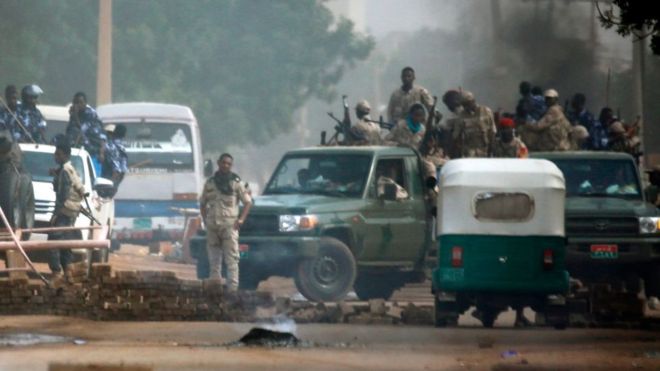The number of people killed in a crackdown on pro-democracy protests in the Sudanese capital Khartoum has risen to 60, an opposition group says.
Members of a feared paramilitary group are reported to be roaming the streets attacking civilians.
The violence began when forces of the Transitional Military Council (TMC) opened fire on unarmed protesters on Monday.
The military has faced international condemnation for the attack.
An attempt by the UK and Germany at the UN to call on the Sudanese military to stop the violence was blocked on Tuesday by China, which was backed by Russia.
What is happening in Sudan?
Demonstrators had been occupying the square in front of the military headquarters since 6 April, five days before President Omar al-Bashir was overthrown after 30 years in power.
Their representatives had been negotiating a deal with the TMC and had agreed a three-year transition which would culminate in elections.
But on Monday, forces moved in to remove protesters from the square.
Many Khartoum residents blamed the Rapid Support Forces for the crackdown. The paramilitary unit – formerly known as the Janjaweed – gained notoriety in the Darfur conflict in western Sudan.
The TMC then announced polls would be held within nine months. The demonstrators had argued that a longer period was needed in order to guarantee fair elections and dismantle the political network associated with the former government.
Sudan’s old politics re-emerg
Sudan’s military has faced international condemnation for its attack, but there were clear signs this was likely to happen. The country has been driven backwards by a military elite intent on holding on to power.
The TMC has scrapped agreements reached with the opposition Forces of Freedom and Change (FFC), saying this will speed up the transition to democratic elections. That plan is likely a fiction.
The military also enjoys another advantage. In an age of international division, the notion of an “international community” pressuring the regime is fantasy. Sudan’s crisis has exposed the reality of international politics – that force can have its way, without consequence, if the killers and torturers represent a valuable asset to other powers.
It is impossible to say whether the FFC can come back as a street-driven force. What will not change – in fact what has been deepened – is the alienation of people from their rulers.






 WhatsApp us
WhatsApp us 

